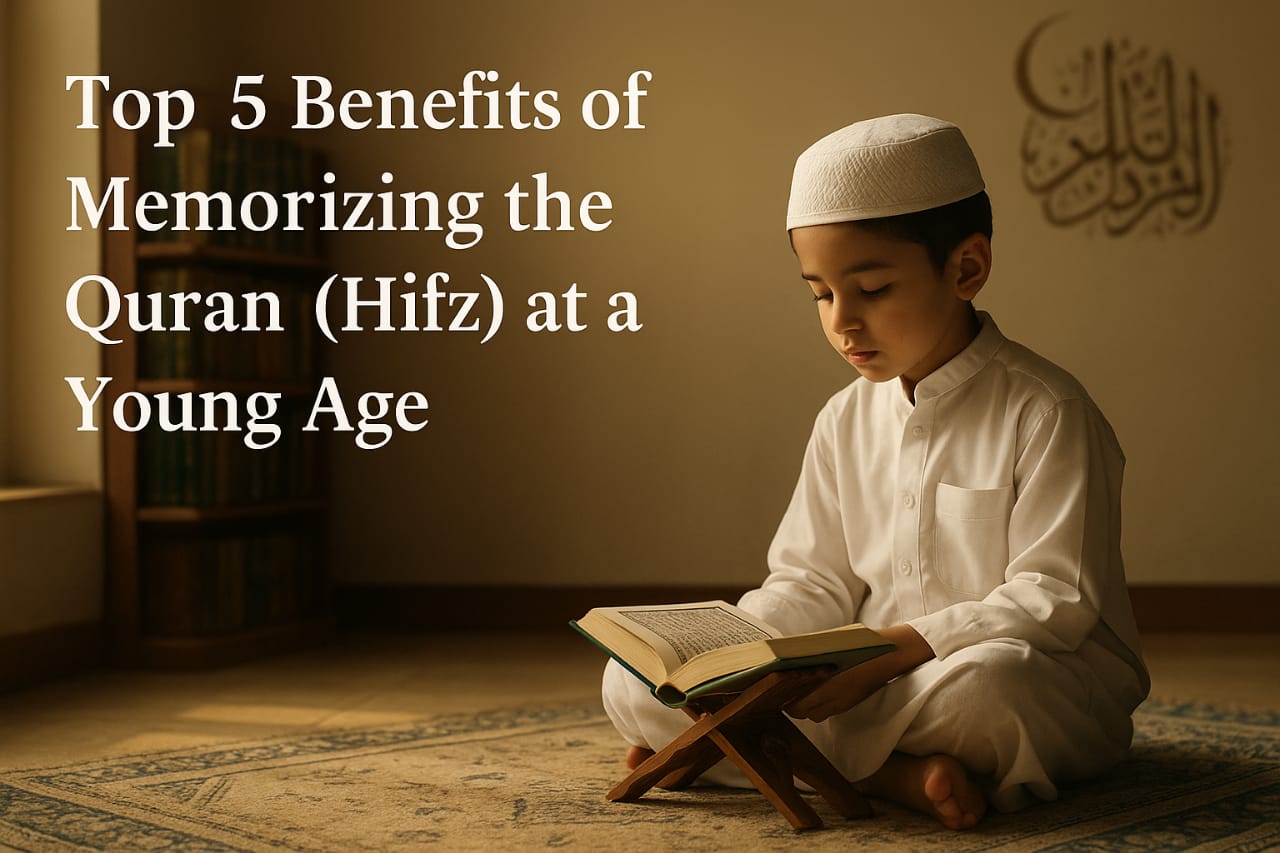Introduction to Hifz
What is Hifz?
Hifz, or the memorization of the Quran, is one of the most revered and spiritually uplifting achievements in Islam. It involves committing the entire Holy Quran to memory—a feat that demands patience, discipline, and dedication. This sacred act has been preserved through generations, forming a vital part of Islamic heritage.
Why Start Young?
Young children have a natural ability to absorb and retain information. Their brains are like sponges, especially during the formative years between ages 5 to 12. This makes childhood an ideal time to embark on the spiritual journey of memorizing the Quran. Not only is it easier for them to memorize at this age, but the long-term benefits are both worldly and eternal.
1. Boosts Brain Development
Scientific Insights
Several studies show that memorization in early childhood stimulates critical parts of the brain responsible for cognitive functions like concentration, analytical thinking, and long-term memory. The repeated recitation and understanding of Quranic verses enhance neuroplasticity—making the brain more adaptable and efficient.
Real-Life Examples
Young Hufaaz (those who have memorized the Quran) often excel academically. In many documented cases, children in Hifz programs show improved performance in school subjects like math and language arts. Their memory capacity, focus, and ability to organize thoughts surpass average levels.
2. Strengthens Faith and Spiritual Discipline
Connection with Allah
When a child learns the Quran from a young age, they develop a deep connection with the words of Allah. They are not just memorizing texts—they are building a relationship with their Creator. This connection fosters taqwa (God-consciousness) and keeps them grounded in Islamic values.
Building Strong Habits
Hifz instills a daily routine of prayer, discipline, and structured learning. Children who memorize the Quran regularly pray on time, reflect on divine teachings, and build habits that stay with them for life. It’s more than memorization—it’s spiritual nurturing.
3. Enhances Focus and Patience
Concentration Skills
Memorizing large volumes of text requires immense focus. As children advance in their Hifz journey, their attention span increases. This ability spills over into their academic life and daily responsibilities, helping them stay attentive and goal-oriented.
Patience Through Repetition
Children learn to repeat and revise daily. This repetition teaches them patience—an essential trait for success in both the Dunya (world) and Akhirah (Hereafter). The process also teaches children not to give up easily, no matter how challenging something may seem.
4. Opens Future Religious and Academic Opportunities
Career and Scholarships
A Hafiz of the Quran gains access to various academic scholarships, particularly in Islamic universities worldwide. Many Islamic schools and institutions offer tuition discounts or special scholarships for Hufaaz students due to their dedication and discipline.
Role of Hufaaz in Society
Being a Hafiz is a badge of honor in Muslim communities. They are often chosen to lead Taraweeh prayers in Ramadan and are looked up to as role models. Their status comes with respect, influence, and the opportunity to serve the Ummah (Muslim community).
5. Builds a Strong Muslim Identity
Confidence and Leadership
Children who memorize the Quran often grow into confident individuals. They feel a sense of accomplishment early in life and tend to become natural leaders among their peers—especially in religious and cultural settings.
Long-Term Moral Compass
The teachings of the Quran become a moral guide. Even in the face of temptation or peer pressure, children who have memorized the Quran are more likely to make ethical choices rooted in Islamic teachings.
How Parents Can Support Their Children in Hifz
Tips for Encouragement
-
Set a consistent time for Quran memorization.
-
Celebrate small milestones.
-
Be patient and encouraging.
-
Avoid comparisons with other children.
Choosing the Right Hifz School
-
Look for experienced teachers (Qaris).
-
Ensure the school balances religious and secular education.
-
Evaluate the school’s track record with Hufaaz students.
Challenges in Hifz and How to Overcome Them
Common Struggles
-
Forgetting previously memorized sections.
-
Lack of motivation or interest.
-
Academic pressure from secular studies.
Solutions and Parental Role
-
Daily revision routines.
-
Create a supportive and distraction-free environment.
-
Involve family members in encouragement and reward systems.
FAQs
1. At what age should my child start Hifz?
Ideally, between the ages of 5–7 is a good time to start. However, it depends on the child’s readiness and interest.
2. Can my child do both school and Hifz together?
Yes, many programs are structured to accommodate both. Discipline and time management are key.
3. What if my child forgets portions of the Quran?
Forgetfulness is normal. Regular revision and support from teachers can help retain memorized portions.
4. How long does it take to complete Hifz?
It varies by individual. On average, dedicated children can complete it in 2–4 years with consistent effort.
5. Is it necessary to understand the Quran while memorizing it?
While memorization is the goal, understanding helps strengthen faith and retention. It is highly encouraged.
6. Are girls encouraged to become Hufaaz?
Absolutely! Hifz is encouraged for both boys and girls in Islam. Many girls successfully complete Hifz worldwide.
Conclusion
Memorizing the Quran at a young age is one of the most impactful gifts a parent can offer their child. It builds memory, strengthens faith, shapes character, and offers numerous worldly and spiritual rewards. By investing time and effort in a child’s Hifz journey, parents are not only securing blessings in this life but also the next.






